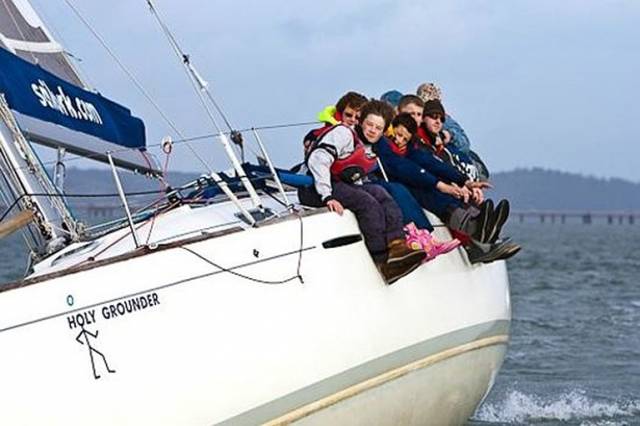After decades of expansion, many participant sports which are at the heart of our way of life have in recent years seen the numbers actively involved becoming static at best, and in many cases contracting. This is particularly the case with non-spectator sports, and sailing is very far from being immune to the trend. W M Nixon takes a look at a developing situation, and how it might develop in the future.
The acute economic recession of 2007-2009 certainly had a damaging effect on amateur recreation generally, and particularly on costly vehicle and equipment sports, of which sailing is a prime and high profile example. But as well, the way that people live now, with increased consumer choices in sport as in other areas of recreation, means that the traditional Irish club sailing model, with its attendant clubhouse and facility costs, has to undergo change if it is to achieve some new level of dynamic equilibrium to function successfully in the future, and attract new membership.
The recent sad death of Arthur Rumball, who had played a significant role in the expansion of the Irish National Sailing School in Dun Laoghaire, inevitably poses the question of why the INSS could report such impressive numbers of newcomers giving sailing a try, with many of them going on to more active involvement, yet it is no secret that sailing clubs sharing Dun Laoghaire Harbour were in some cases seeing alarming fall-offs in activity and membership.
With the inspiring leadership of its founder Alistair Rumball, the INSS had come through the recession by quickly adjusting to the deteriorating situation, severely reducing its costs, and utilizing other sources of income to maintain the momentum to put it in a strong position to revive after the recession. Now it has a more active and larger training fleet than ever, it has put thousands of people through its courses, and in 2015 it even founded its own sailing club within its own structure in order to enable its alumni to enter major events without the significant personal cost incurred in being members of one of the historic yet inevitably expensive Dun Laoghaire yachts clubs
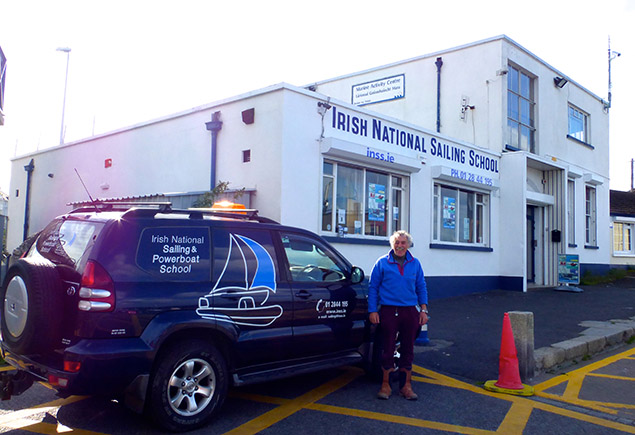
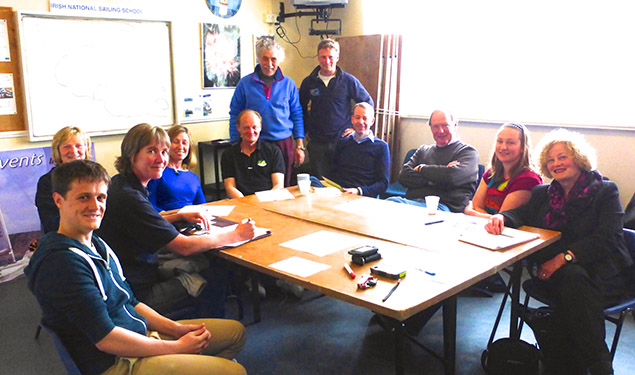
With a commercial marina at its heart, the Dun Laoghaire sailing establishment faces the challenge of people being involved in sailing on Dublin Bay without being involved in the traditional membership of the waterfront clubs. It was an issue which was addressed here on November 22nd with a discussion inaugurated in a thoughtful article by David O’Brien which highlighted the problems facing the existing Dun Laoghaire sailing setup.
In such a situation, there’s a tendency to think that local solutions must be found to what is perceived as a local problem, but in fact it’s a worldwide matter. The reality is that in Europe, boat numbers and major sailing events are tending to shift southwards towards sunnier climes and warmer seas, and the northern countries such as Ireland, the UK, the Netherlands and Scandinavia, the places where recreational sailing has a much longer history, are seeing a sometimes small but always significant decline.
Thus in The Netherlands – which I would tend to view as Europe’s premier maritime nation – the national sailing authority is anticipating a fall-off in boat numbers of 25% by 2050. But whether that means a fall-off of 25% in participating sailors is another matter altogether, as the reckoning is that boat-sharing is going to rise, and inevitably with it the professional management of group-owned boats.
This may well be the biggest longterm problem facing Irish yacht and sailing clubs. In the final analysis, the private yacht owner is the backbone of any club, for an owner who wishes to get the best possible value from his boat will usually see his club as an important adjunct of the total package, a backup service to provide facilities for the socialising of his crew. This is particularly so in the case of top racing boats, which will need a crew panel of perhaps as much as three multiples of the actual racing crew in order to ensure that a full racing crew is always available.
That said, I do realize that there are owners who keep their boats in Dun Laoghaire marina and yet are able to get an active racing programme thanks only to their membership of Dublin Bay Sailing Club. And equally I realise that there are cruising enthusiasts who operate out of Dun Laoghaire marina without being a member of any club at all. That is their right and privilege, but for the rest of us, membership of a club with its unique history, traditions of voluntary service, shared enthusiasms, and pooling of resources is an integral part of the entire sailing experience.
But as the already old clubs become even older with every passing year, how do they continue to appeal to newcomers who see sailing as just another experience in life’s rich tableau? Something to be tried for one weekend perhaps? But the next weekend, you might try something entirely different? And who knows what you might be tasting the weekend after that?
Surprise us, just surprise us - that’s what they demand. For a significant sector of the population, modern leisure life is a sort of tasting menu of recreational experiences. If we acknowledge that this is the case, then we should be happy that the growing number of sailing schools can cater for newcomers whose longterm involvement in sailing may range from just one weekend around boats per year, to the almost obsessional involvement and enthusiastic participation in every possible moment by the people who give their hearts and soul to serving the sailing clubs to which in the end they give their total loyalty.
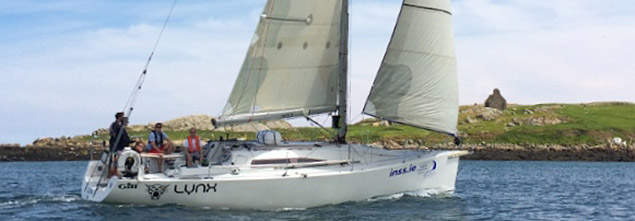 Normally we associate the INSS’s Reflex 38 Lynx with high-profile racing, but for much of the time she has to earn her keep introducing newcomers to cruiser sailing, as seen here on passage through Dalkey Sound.
Normally we associate the INSS’s Reflex 38 Lynx with high-profile racing, but for much of the time she has to earn her keep introducing newcomers to cruiser sailing, as seen here on passage through Dalkey Sound.
The problem for clubs in trying to accommodate such a range of involvement is that if they distort their true character too much in order to attract casual newcomers, they will offend their established membership. But if the old guard totally rule the roost, newcomer will be immediately put off. Underneath it all is the ever-present problem of money, for we may have had as much as an entire lost decade of static or reduced income.
Even though the national economy itself is improving, that economy is in the here and now. At a personal level, there are lasting legacy issues for people who were particularly hard hit during the recessionary years, and whose personal finances may never fully recover. Club managements have to accommodate such people who have given much in time and energy, and have much still to give, to the club which they see as central to their sailing.
But those who would adopt a more brutalist approach will suggest that the most ruthless market forces be allowed to operate, and if for instance a club’s catering can no longer match the hospitality package of nearby restaurants and pubs with food, then it should either put its entire restaurant out to contract and public use, or else diminish the service and acknowledge the fact that people go elsewhere.
As to direct waterfront facilities for servicing boats, the brutalists would sometimes suggest that they too should look to professional sourcing rather than expect them to be organised on an ad hoc basis by the clubs, as is largely the case in the Dublin area. Yet the fact is it works – if it ain’t broke, then why try and fix it?
The irony of all this is that the leading providers of professional sailing introduction and instruction through the sailing schools of Dublin and Cork Harbour are themselves products of established yacht clubs. The late Arthur Rumball as a kid used to spend almost every waking hour in and around Malahide Sailing Club “messing about in boats”, such that - as a former officer of the club put it this week - no matter who you were, if you really wanted to know what was going on about the place, Arthur was the most reliable source of all information. And in adult life, he was married to the daughter of a former Commodore of one of the premier Dun Laoghaire yacht clubs.
As for his older brother Alistair, seen by many as Irish sailing’s ultimate maverick and cage-rattler, the fact is that for many years he has been a member in good standing of another of the historic waterfront clubs. It’s a place of which he is so fond that he has said of it with pride that you either get it, or you don’t, and if you don’t get it – that is, comprehend its deeper meaning almost immediately through some sixth sense - then there’s no point in anyone trying to explain to you what it’s all about.
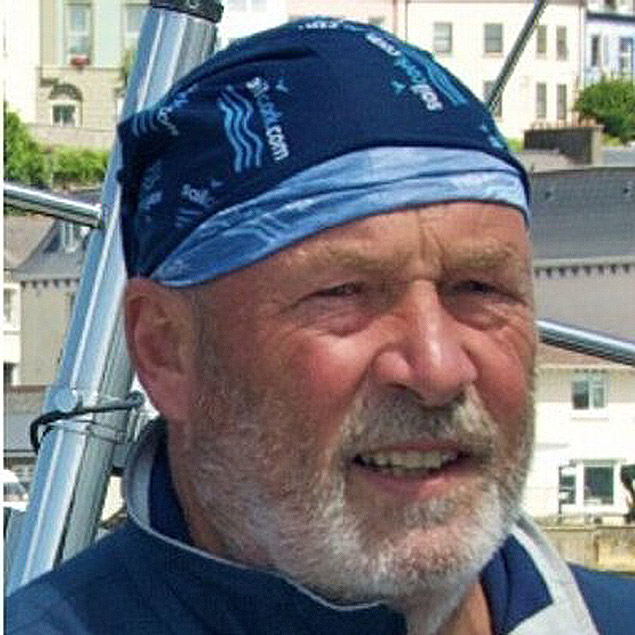 Eddie English of SailCork
Eddie English of SailCork
Equally in Cork, the great Eddie English of SailCork is a pillar of one of Cork Harbour’s leading sailing families. Yet he, like the Rumballs, became impatient with the yachting establishment’s reluctance to welcome total newcomers to the sport with complete enthusiasm, and so since 1974 he has been running an expanding operation which has introduced many to sailing.
Some of them enjoy the experience of sailing with Eddie English so much that they return year after year to make the learning of sailing their hobby, but others go on to themselves become central to the club-based Cork Harbour sailing scene. As for Eddie’s mission in life, it has long included an international dimension, as charter cruises with SailCork crews in the Caribbean have become a staple of the annual programme. But so too is active co-operation with local clubs – in the New Year, SailCork will be running a course within the Royal Cork YC membership in Crosshaven.
One of the factors in the current difficult situation is that sailing has become newly high profile thanks to Annalise Murphy’s Silver Medal in the Rio Olympics, and the generally high standard of results being achieved both by the rest of the Olympic sailing team, and the top sailors in the ISA’s High Performance squad.
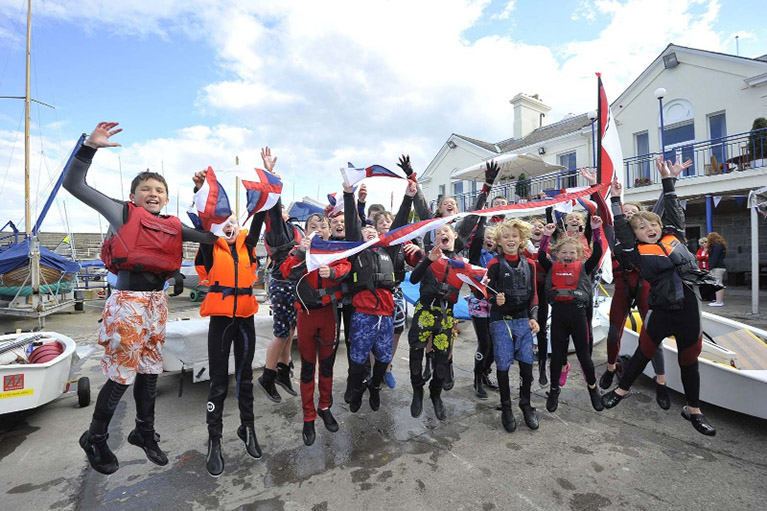 It lifted everyone’s spirits – junior sailors at the National Yacht Club in Dun Laoghaire celebrate their clubmate Annalise Murphy’s Silver Medal in Rio, August 2016. Photo: Michael Chester
It lifted everyone’s spirits – junior sailors at the National Yacht Club in Dun Laoghaire celebrate their clubmate Annalise Murphy’s Silver Medal in Rio, August 2016. Photo: Michael Chester
This may be fine and dandy for those who wish sailing to be seen in a good light by the general public, with all that might mean in improved government grants. But it meant that at grass roots level, your everyday sailor of average achievement has felt distinctly left out, and that in turn was leading to a fall-off of interest in ordinary club activity.
But there are encouraging signs that a realization of the unhealthy nature of a sailing scene overly skewed towards excessive interest in superstars is leading to a reaction in favour of looking after the needs of ordinary sailors. A significant sector of our sport would like to see less of the spotlight totally focused on racing, and club managements are taking notice of this.
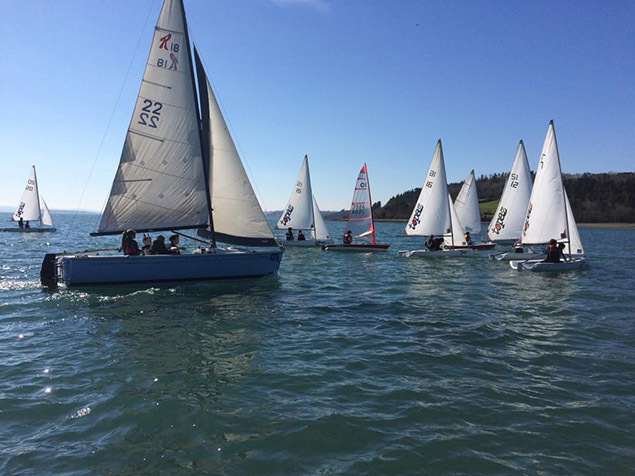 “Just get them afloat and sailing, and the interest and involvement will take off from there”. SailCork’s motley fleet does sterling service on Cork Harbour.
“Just get them afloat and sailing, and the interest and involvement will take off from there”. SailCork’s motley fleet does sterling service on Cork Harbour.
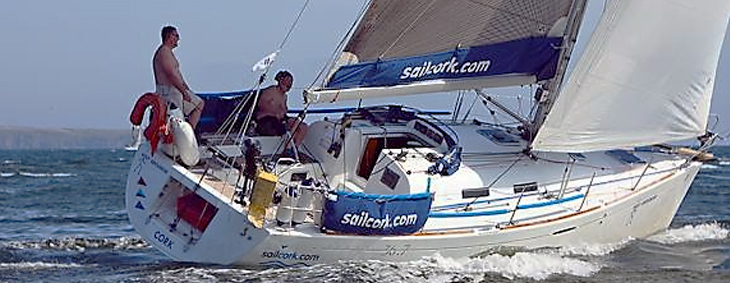 Graduate level. SailCork’s First 36.7 Holy Grounder regularly cruises to West Cork and beyond.
Graduate level. SailCork’s First 36.7 Holy Grounder regularly cruises to West Cork and beyond.
One of the questions raised in the discussion on the 22nd November think-piece was brought up by cruising guru Norman Kean, who noted that just about everything being discussed related to racing matters, whereas those who really do prefer simply messing about in boats may well be the majority.
But racing produces its own flow of publicity with a narrative simply by publishing results, whereas for many, proper cruising is a blind spot except where log competitions have been introduced. Yet the cruisers are there. One of the interesting points to emerge from this week’s AGM of Howth YC was the news that HYC’s Cruising Group, founded with the opening of the new clubhouse in 1987 at the instigation of Commodore Tom Fitzpatrick with Gary McGuire as the first convenor, is now a gathering of like-minded souls who number around 120, and they meet regularly and frequently to share and develop their non-competitive interest in boats and sailing.
This is an important part of what a healthy yacht club’s life - week in, week out - should be all about. But providing it at an affordable cost is a matter of sound management and the readiness of the membership to come forward to fill essential voluntary roles. The yacht and sailing clubs of Ireland have been through a torrid time in recent years. But the signs are that an increasing number of people are now realizing that in the constant flux of modern life, the clubs are an important anchor in our maritime life.
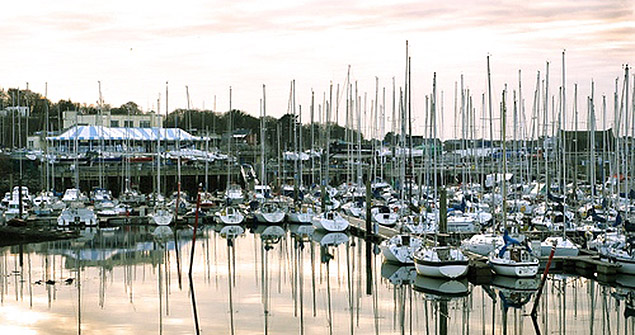 Howth YC and its marina - the clubs are an important anchor in our maritime life. The HYC Cruising Group has 120 members who meet regularly and frequently, and racing is most definitely not on their agenda.
Howth YC and its marina - the clubs are an important anchor in our maritime life. The HYC Cruising Group has 120 members who meet regularly and frequently, and racing is most definitely not on their agenda.
Thus it’s the duty of every member to contribute to this improved mood. Your club should not be seen as some commercial service to be criticized as a matter of course, Rather, you should see your club as something of which you are part, and to which you should contribute in a positive way, and to which you should welcome newcomers. Ultimately, you’ll only get out of sailing and club life what you put into it in the first place.



























